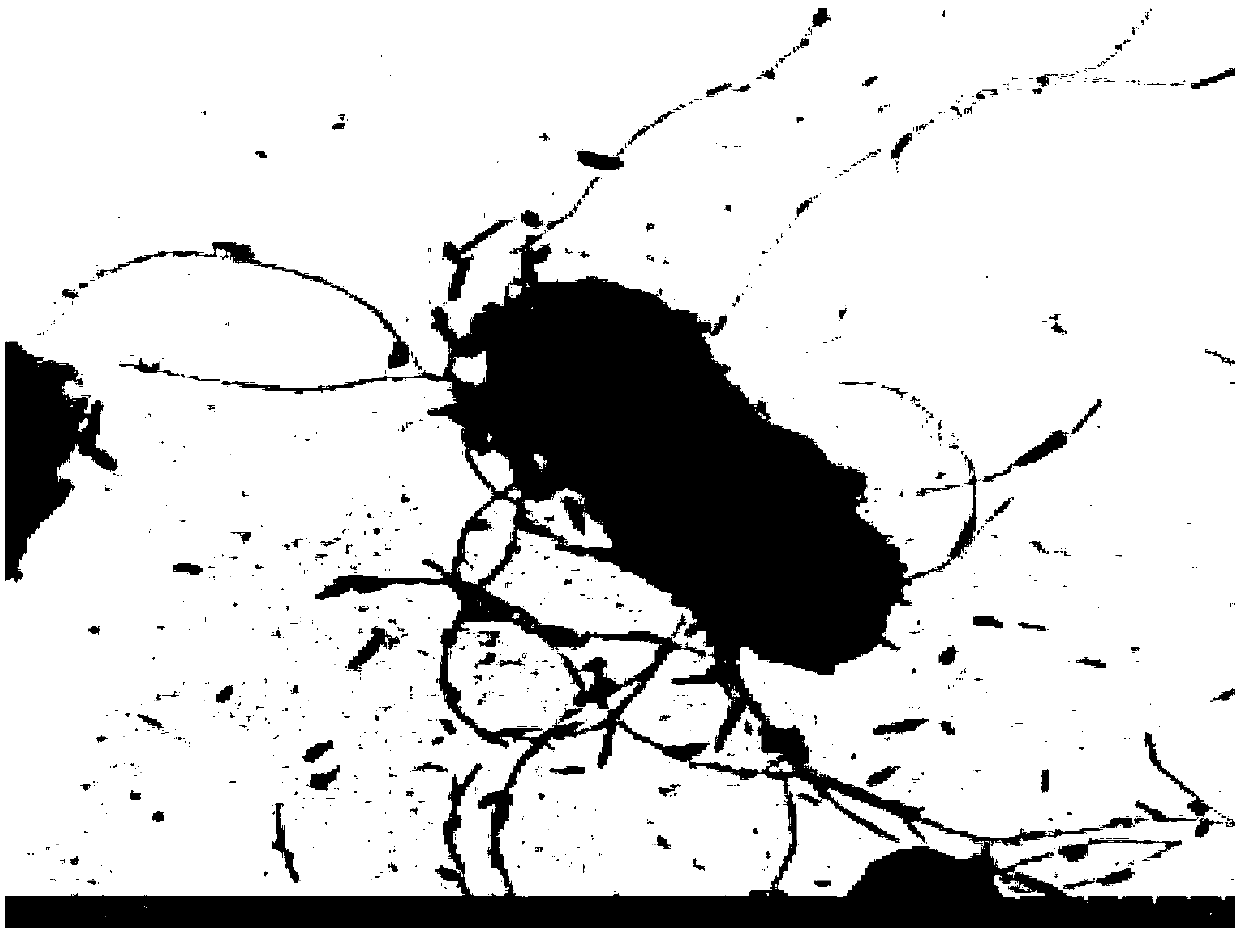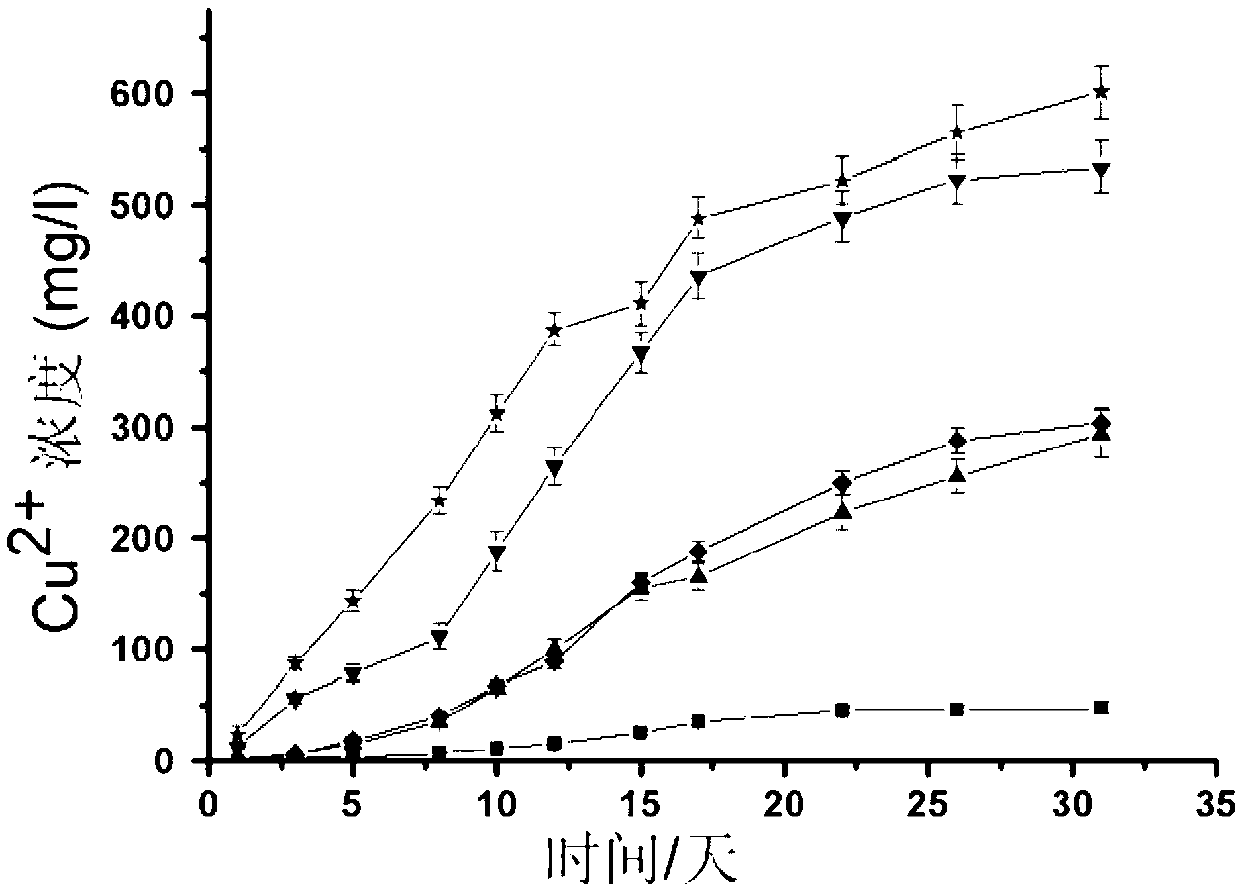Eosino-thiobacillus and application thereof to copper pyrites leaching
A technology of Thiobacillus acidophilus and chalcopyrite, applied in the directions of bacteria, process efficiency improvement, microorganism-based methods, etc., can solve the problems of reducing bacterial concentration, reducing leaching efficiency, affecting leaching efficiency, etc., to reduce generation and high efficiency. The effect of using
- Summary
- Abstract
- Description
- Claims
- Application Information
AI Technical Summary
Problems solved by technology
Method used
Image
Examples
Embodiment 1
[0017] Example 1 strain screening
[0018] In this example, 100mL of the wet leaching heap of the Zijinshan Copper Mine in Shanghang County, Fujian Province was taken, and the large particles were first filtered with filter paper, and then the filtrate was added to a 250ml Erlenmeyer flask containing 1% chalcopyrite, at 30°C, 170r / h min, carry out enrichment culture for 4 days, repeat 3-4 times, use Starky-Na 2 S 2 o 3 ·5H 2 O medium for plate separation, after 2 weeks, colonies are formed, and single bacteria are picked and dropped into Starky-S 0 The culture medium was cultured, and the plate separation was repeated 4 times to obtain pure bacteria.
Embodiment 2
[0019] Example 2 strain identification
[0020] The entire genome of the pure culture was extracted using the Bacterial Whole Genome Rapid Extraction Kit, and PCR was performed with 16S rDNA universal primers to identify the strain as Thiobacillus acidophilus.
Embodiment 3
[0021] Physiology, biochemistry and resistance research of the bacterial strain of embodiment 3
[0022] The morphology of the above-mentioned ZJJN was observed by transmission electron microscopy as follows: figure 1 . Take 10°C, 20°C, 25°C, 30°C and 45°C for the culture of the strains screened to determine the optimum growth temperature is 30°C; take initial pH 0.5, 0.8, 1.0, 1.5, 2.0 and 2.5 at the optimum The culture is carried out at a temperature, and the optimum growth pH range is determined to be 0.5-1.5. Determine the optimal energy substrate (g / l) S for the strain ZJJN by the following combination 0 10.0g, Na 2 S 2 o 3 ·5H 2 O10.0; FeSO 4 ·7H 2 O10.0; FeCl 2 10.0; Peptone 10.0; Yeast Extract 10.0; Glucose 10.0; Fructose, 10.0;
[0023] Using several antibiotics with a concentration gradient of 10 and 100mg / l, it was found that the sensitivity order of ZJJN to several common antibiotics was tetracycline > streptomycin > erythromycin > chloramphenicol > kanam...
PUM
 Login to View More
Login to View More Abstract
Description
Claims
Application Information
 Login to View More
Login to View More - R&D
- Intellectual Property
- Life Sciences
- Materials
- Tech Scout
- Unparalleled Data Quality
- Higher Quality Content
- 60% Fewer Hallucinations
Browse by: Latest US Patents, China's latest patents, Technical Efficacy Thesaurus, Application Domain, Technology Topic, Popular Technical Reports.
© 2025 PatSnap. All rights reserved.Legal|Privacy policy|Modern Slavery Act Transparency Statement|Sitemap|About US| Contact US: help@patsnap.com



